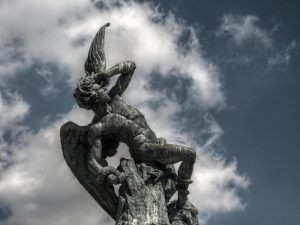Lois Parshley in Nautilus:
 “Of man’s first disobedience, and the fruit of that forbidden tree,” John Basinger said aloud to himself, as he walked on a treadmill. “Of man’s first disobedience…” In 1992, at the age of 58, Basinger decided to memorize Paradise Lost, John Milton’s epic poem, as a form of mental activity while he was working out at the gym. An actor, he’d memorized shorter poems before, and he wanted to see how much of the epic he could remember. “As I finished each book,” he wrote, “I began to perform it and keep it alive in repertory while committing the next to memory.” The 12 books of Paradise Lost contain over 60,000 words; it took Basinger about 3,000 hours to learn them by rote. He did so by reciting the piece, line-by-line out loud, for about an hour a day for nine years. When he memorized all 12 books, in 2001, Basinger performed the masterpiece in a live recital that lasted three days. Since then, he’s performed smaller sections for various audiences, eventually attracting the attention of John Seamon, a psychologist at Wesleyan University, in Connecticut. In 2008, “He recited for an hour in the Wesleyan library,” says Seamon. “He’d given out copies of Milton’s book so we could follow along. At the end of the talk I introduced myself and said ‘I’d love to study your memory.’” Basinger agreed, and so Seamon devised a test.
“Of man’s first disobedience, and the fruit of that forbidden tree,” John Basinger said aloud to himself, as he walked on a treadmill. “Of man’s first disobedience…” In 1992, at the age of 58, Basinger decided to memorize Paradise Lost, John Milton’s epic poem, as a form of mental activity while he was working out at the gym. An actor, he’d memorized shorter poems before, and he wanted to see how much of the epic he could remember. “As I finished each book,” he wrote, “I began to perform it and keep it alive in repertory while committing the next to memory.” The 12 books of Paradise Lost contain over 60,000 words; it took Basinger about 3,000 hours to learn them by rote. He did so by reciting the piece, line-by-line out loud, for about an hour a day for nine years. When he memorized all 12 books, in 2001, Basinger performed the masterpiece in a live recital that lasted three days. Since then, he’s performed smaller sections for various audiences, eventually attracting the attention of John Seamon, a psychologist at Wesleyan University, in Connecticut. In 2008, “He recited for an hour in the Wesleyan library,” says Seamon. “He’d given out copies of Milton’s book so we could follow along. At the end of the talk I introduced myself and said ‘I’d love to study your memory.’” Basinger agreed, and so Seamon devised a test.
Then 74, Basinger came into the lab to perform a series of cued recall tests. Scientists read two successive lines from each of the poem’s 12 books and then asked Basinger to recall the next 10 lines. The results, published in Memory in 2010, were surprising: Despite the amount of elapsed time since his memorization process, Basinger’s recall was, overall, word-perfect 88 percent of the time. When he was prompted with lines that opened one of the 12 books, his accuracy increased to 98 percent.
Seamon wondered how he might explain this performance, and realized deliberate practice theory could be useful. Although it was “formulated to account for elite performance in chess, music, and sports, it provides a reasonable basis for interpreting JB’s procedure for memorising Paradise Lost,” says Seamon. “He too, in daily short sessions, devoted thousands of hours of study over a period of years to achieve his mastery of Milton.” But Basinger didn’t just remember the words; it would be a mistake, says Seamon, to interpret Basinger’s performance as “simply a remarkable demonstration of brute force, rote memorisation.” In order to memorize the epic poem, he spent a lot of time repeatedly analyzing its meaning and structure. Acting researchers emphasize this strategy, Seamon notes: “Deep encoding requires actors to attend to the exact wording of lines, and it is the focus on exact wording to gain an understanding of the characters that yields verbatim memory, instead of merely the retention of gist.”
More here.
